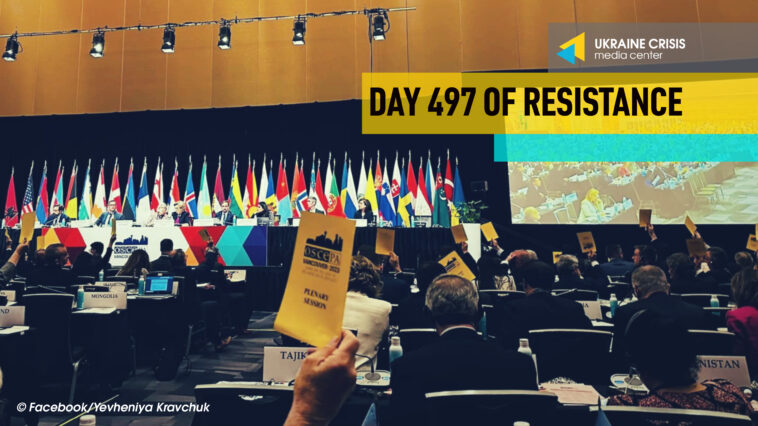What Ukraine will get at the upcoming NATO summit in Vilnius. What’s happening at the Zaporizhzhia nuclear power plant. The OSCE Parliamentary Assembly designates the Wagner Group as a terrorist entity, and labels Russia as a state sponsor of terrorism.
What Ukraine will get at upcoming NATO summit in Vilnius
Despite intense discussions, NATO countries will manage to agree commitments to Ukraine at the forthcoming Vilnius summit that will not disappoint Ukraine, Lithuanian President Gitanas Nausėda said in an interview with BNS. “I have a feeling that we will, nevertheless, agree on those wordings that will not disappoint the Ukrainians and will say more than what we are used to saying,” President Nausėda said.
Some NATO countries will come to Vilnius with commitments to provide security guarantees to Ukraine, the Lithuanian leader said, and there’s already agreement on the establishment of a NATO-Ukraine Council to strengthen Kyiv’s integration into the alliance.
“Yes, NATO’s door is open, but it opens very quickly for some countries, while others cannot find that door, and I think the Ukrainians are quite rightly raising the issue of not being a member of NATO today yet,” Nauseda said.
At the Vilnius summit of 11-12, NATO leaders need to start the process of accelerated admission of Ukraine. NATO has at most a year for this, diplomatic editor and columnist Roger Boyes said in a column for The Times. At the Vilnius summit NATO leaders need to move away from the usual bureaucratic procedures, forget diplomatic games and start the process of accelerated admission of Ukraine, he said.
The priority at the NATO summit is to find an intermediate but reliable way to ensure the security of Ukraine, while the decision on admission passes through parliaments and chancelleries. NATO has at most a year for all this, because after the elections at the end of next year, Donald Trump may return to the White House, Roger Boyes said.
What’s happening at Zaporizhzhia nuclear power plant
Russia remains unlikely to generate a radiological incident at the Zaporizhzhia nuclear power plant at this time, the Institute for the Study of War (ISW) said in a report on July 4. Russia is likely focused on accusing Ukraine of irresponsible actions around the plant including setting conditions for a possible false flag attack. ISW has previously assessed that such provocative Russian statements, and even the possibility of a tangible provocation at the plant, are likely part of a Russian wider information operation meant to accuse Ukraine of irresponsibility at the plant ahead of the upcoming NATO summit.
As ISW has previously reported, it is unlikely that limited Russian sabotage at the Zaporizhzhia nuclear power plant that Russia could hope to blame on Ukraine would be able to generate a massive radiological incident, as the plant’s reactors were constructed to withstand considerable damage. Ukrainian military sources reiterated this assessment and noted that even if the purported explosive devices [that Russian forces placed on the outer roofs of the third and fourth reactors] detonate, the damage would not harm the reactor but would rather create the false impression that Ukrainian forces had shelled the reactors.
In the meantime, Ukraine’s European allies will keep an eye on the situation with the plant. On a phone call with French President Emmanuel Macron, President Zelenskyi said he warned his counterpart that “the occupation troops are preparing dangerous provocations at the Zaporizhzhia nuclear power plant.” “We agreed to keep the situation under maximum control together with the International Atomic Energy Agency (IAEA),” Zelenskyi said.
In his nightly address on July 4, Zelenskyi echoed intelligence reports that Russia was preparing to stage a provocation at the plant. “Russia must clearly realize that the world sees the scenarios terrorists are preparing, and that the world is ready to respond,” the President said.
As of the morning of July 5, the plant ran as normal. There was no significant movement of Russian troops and equipment, head of the Nikopol district military administration Yevhen Yevtushenko said.
OSCE Parliamentary Assembly designates Wagner Group as terrorist entity, labels Russia state sponsor of terrorism
In the Vancouver declaration passed on July 4, the OSCE Parliamentary Assembly designated the Wagner Group as a terrorist organization, and labeled Russia a state sponsor of terrorism.
One of the resolutions passed during the annual session, emphasized that “terrorism constitutes one of the most serious threats to international peace and security”. The resolution “determines that the actions of the Wagner Group on behalf of the Russian Government can rightly be characterized as terroristic in nature and intent, and that designation of the Wagner Group as a terrorist organization by national authorities is therefore justified.” The document says that “the President of the Russian Federation has publicly admitted – after years of Kremlin denials – that the Wagner Group had been “fully funded” by the Russian State.
The resolution calls on OSCE participating States “to take action against the Wagner Group and its affiliated and successor entities, including through its designation as a terrorist organization.”
“There is a ‘state sponsor of terrorism’ definition in U.S. law, and other OSCE members are also familiar with the term,” Ukrainian MP Yevhenia Kravchuk participating in the session said. “I hope that the decision will catalyze labeling the aggressor as a state sponsor of terrorism not only in the U.S., but internationally. Terrorism should not go unnoticed and should not be allowed to avoid justice,” she said.




